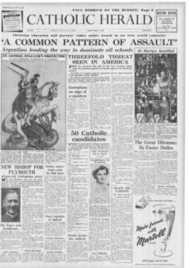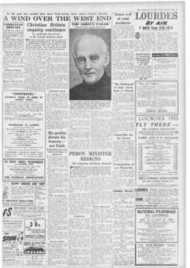Page 3, 22nd April 1955
Page 3

Report an error
Noticed an error on this page?If you've noticed an error in this article please click here to report it.
Tags
Share
Related articles
Recent Paperbacks
Celebrating The Liturgy From "his People's Way Of Talking" A
University Chaplaincies
English Church
Prophetic Thoughts Of Jock Dalrymple
PRAYER AND LAY APOSTOLATE
HEY, YOU!, by Michael Hollings (Bums Oates, 6s.) WE ARE MEN. by John M. Todd (Sheed & Ward, 7s. 6d.)
14-1R. MICHAEL HOLLINGS has the bill-poster title, the very direct and conversational style, and the absence of all techniques except absolute sincerity and earnestness in his arresting call to pray; Mr. John Todd has the title owed to the great Cardinal Suhard, and the carefully planned treatise on the apostolate, in his " Book for Christian Laymen." Here is an inversion of roles which argues well for the health of Catholicism in England.
Hey You ! Is meant to pull us all up short with the direct order " Pray always." " Hey, You! Yes! You ! Get things straight! Be what you are always talking about. Leaven the world. Start praying. Now! . . I am telling you to pray more. I am telling you to he a saint." That is how Fr. Hollings starts his forthright appeal to all of us to make prayer the stuff and substance of our lives.
If he does not keep up that degree of typographical urgency, he does throughout his book keep up the absolute earnestness and sincerity which dictates it. The book falls easily into two sections "Getting Down To Prayer," and "Living Through the Lithurgy."
The first meets all the objections to praying always; the second shows how it is done through the Mass and the liturgy. The first is remarkable for the apt use of modern idiom. and the forthrightness one would expect of a former Guards Officer; and the second is enlivened and illustrated by Fr. Hollings's personal knowledge of many of the Holy Places of Palestine.
" DOnot, therefore. he afraid that You will be less of a Christian the more you are a man." So wrote Cardinal Suhard in his great pastoral letter Rise or Decline of the Church, and the words set the theme for his " Book for Christian Laymen."
Mr. Todd describes his book as " incomplete and tentative "; but, in fact. he has not missed much. Dividing his book into a consideration of the apostolate first of the family. then of work, thirdly of leisure. and lastly of religion, he considers fathers. mothers, children, workers, intellectuals, priests, monks and virgins.
"In each chapter," he writes. " I have tried to look at the present state of society in relation to the particular state of man considered; then I have tried to give the Christian ideal, and finally to make some particular suggestions of a more or less practical nature. . .
" The hook is intended to be readable in its own right, as well as a possible subject for study by groups or individuals preparing for an apostolate."
Among the more or less practical suggestions which the author makes. and which certainly need some open discussion, are the very
varied questions as to whether the Christian can opt out of politics: whether a place should not be found for the layman, the father. in the parish; and the age for the administration of the Sacrament of Confirmation.
This is a thoughtful and thought provoking book; it has not got all the answers by any means; but no one seriously interested in die place of the layman in the Church to-day, and specially his apostolate in the pagan world around him, can afford to neglect reading this valuable contribution to a vast and important subject.
THE YOUNG WORKER, Education for Human Relations (Heinemann, 3s. 6d.)
T' paper-covered pamphlet of some sixty odd pages in length is the report of the Fifth Conference held at Oxford last year by the University Department of Education.
These Conferences on the education of the young worker which began in 1948 have made some notable contributions to our knowledge of the problems involved and possible means of solving them.
But Clubs and Classes will never take the place of Church and God. and it is sad to see so much good will, so many fine and generous efforts, lost in a tangle of modern quarter-truths about "Communities."
HOW TO STUDY the letter of St. Thomas Aquinas to Brother John with the Latin text, a translation. and an exposition by Fr. Victor White. 0,P., which was the lecture read for the inauguration of studies for the year 1944-45 at Hawkesyard Priory and Blackfriars, Oxford, has reached its fifth edition. What more need he said to show what good value for money is this little Is. 6d. brochure from Blackfriars Publications.
WHERE seems to be pretty solid
feeling against the Comprehensive Schools among the practising teachers, no matter how dear they may he to the theorists, the organisers and the administrators; but none can afford to criticise without facing the facts. Many of these, and much else. of importance in connection with these monster Grammar. Modern and Technical Schools is to be found in COMPREHENSIVE SCHOOLS TO-DAY, by Robin Pedley (Councils and Education Press, Ltd.. 3s. 6d.).
" An Interim Survey " of some 15 such schools already in action. it is followed by four new critical essays on the subject by experts.
blog comments powered by Disqus









